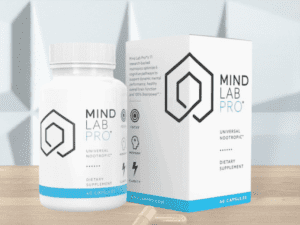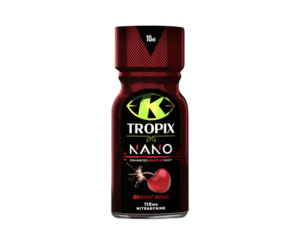As a certified Functional Nutritional Therapy Practitioner, I’m often asked about natural solutions for improving brain health and kicking bad habits. One of the most common and challenging addictions I help clients overcome is smoking cigarettes.
Nicotine hijacks the brain’s own neurotransmitters, triggering fierce cravings and withdrawal when you try to quit. To conquer nicotine addiction for good, it pays to understand the science behind how it hooks the brain.
In this ultimate guide, we’ll demystify smoking’s physical and mental stranglehold so you can discover holistic nicotine detox solutions.
Biohack Your Brainpower
How Nicotine Chemically Addicts The Brain
The addictive nature of nicotine starts with three key neurotransmitters – your brain’s chemical messengers that control mood, cognition, motivation and more. Nicotine interferes with these pathways (1):
1. Dopamine
Nicotine stimulates the release of dopamine, your “feel good” neurotransmitter. This triggers the brain’s reward centers, linking smoking with pleasure, relaxation, and reduced stress.
Unfortunately, constant nicotine exposure alters dopamine receptors, fooling your brain into “needing” cigarettes simply to bring dopamine back to normal levels. This is at the heart of nicotine addiction.
Learn More: The 15 Best Natural Dopamine Supplements
2. Glutamate
Glutamate is your brain’s primary excitatory neurotransmitter. It’s involved in learning, memory formation and cognitive functions.
Nicotine throws glutamate signaling out of balance. With sudden nicotine cessation, glutamate surges can impair concentration, learning and recall (2).
Learn More: 11 Best Supplements For Neuroplasticity
3. GABA
Gamma-aminobutyric acid (GABA) has a calming effect that counters glutamate’s excitatory influence. Nicotine initially stimulates GABA release, promoting relaxation.
But chronic smoking diminishes GABA activity over time. This is why periods of abstinence can leave you feeling on edge.
Summary: Nicotine alters neurotransmitters essential for stable mood, cognition and stress resilience. Let’s explore how this impacts withdrawal.
Nicotine Withdrawal and Neuroadaptation
Anyone who has tried quitting smoking knows about the notoriously brutal acute nicotine withdrawal phase:

These side effects result from chemical disruptions, including:
- Dopamine depletion resulting in low motivation, fatigue and mood instability
- A glutamate surge impairing cognition
- A drop in relaxing GABA activity sparking anxiety
Over time, neuroadaptation also develops – structural brain changes as it attempts to compensate for nicotine exposure.
Nicotine withdrawal feels so awful because your brain has literally redesigned its circuitry around cigarettes. Conquering both chemical and physical addiction is key to successful cessation.
Learn More: Rewiring The Brain w. Dr. Ashok Gupta
Restoring Brain Balance After Smoking
While the first days and weeks after quitting smoking are brutal, supporting your brain chemistry helps ease symptoms dramatically.
Targeting the three main neurotransmitters disrupted by nicotine offers relief. Helpful holistic interventions include:

Nootropic Supplements
Nootropics enhance cognition by optimizing neurotransmitter levels and neural firing. Helpful options include:
- L-Tyrosine – Amino acid precursor to dopamine
- Mucuna Pruriens – Natural source of relaxing L-Dopa
- Mind Lab Pro – Nootropic blend with Adaptogenic herbs like bacopa monnieri, rhodiola rosea, choline, and more to help rebalance stress response and boost overall cognition

Mind Lab Pro

Buy N-Acetyl L-Tyrosine Capsules 350mg | Nalt by Nootropics Depot

Velvet Bean (Mucuna Pruriens) | 20% L-DOPA – Powder by Science.Bio
Learn More: Best Nootropics For Addiction Recovery
Lifestyle Approaches
Daily habits protecting neurochemistry include:
- Exercise – Boosts dopamine, endorphins and BDNF brain growth factor
- Healthy fats – Stabilize mood-regulating neurotransmitters
- Infrared Sauna Therapy – Detoxification and stress relief
- Focus on Sleep – Enhance your body’s natural recovery system and restore cognitive function
Faraday Infrared Sauna by Sauna Space
Sauna Space Faraday Infrared Sauna takes home wellness to the next level. This sauna combines the benefits of infrared heat with a shielded design to reduce electromagnetic field (EMF) exposure. The Faraday sauna is designed for those who are sensitive to EMF or seeking a more holistic health approach. Its unique construction ensures a safe, relaxing, and detoxifying sauna experience, making it a standout choice for health-conscious individuals.
Pros
- Advanced wellness option
- EMF-sensitive solution
- Safe and effective detox
- Innovative construction
Cons
- Higher price point
- Space requirement
- Initial setup process
- Regular maintenance needed
Balancing neurotransmitters and managing withdrawal empowers you to take control over addiction. The more you understand smoking’s effects on your brain, the more motivated you’ll be to quit for good!
Frequently Asked Questions
Q: What nutrient deficiencies does smoking cause?
Smoking depletes key nutrients like vitamin C, vitamin D, magnesium and B vitamins. Addressing these deficiencies can relieve low energy, brain fog and mood issues in recovery.
Q: How long do nicotine withdrawal symptoms last?
The most intense nicotine withdrawal symptoms peak within the first 1-3 days without cigarettes but can persist for 2-4 weeks as your brain chemistry recalibrates. Gentler PAWS symptoms can come and go for 6-12 months.
Q: What prescription medications help you quit smoking?
Nicotine replacement therapy like patches, lozenges and gum can ease cravings in the short term. Bupropion and varenicline are non-nicotine medications that reduce withdrawal severity. Always discuss options with your doctor.
Q: What holistic approach would you recommend to quit?
I advise custom neurotransmitter testing to pinpoint specific chemical imbalances, then crafting a tailored plan with amino acids, herbs and lifestyle changes to restore balance gradually. Work with a functional medicine practitioner for guidance.
The Bottom Line
I hope this guide gave you a better understanding of the physical and psychological challenges in overcoming smoking addiction. While conquering dependence is tough, supporting your brain chemistry with nutrition, nootropics and healthy lifestyle habits allows you to take back control.
What has been your experience with nicotine addiction? Did a holistic approach help you quit? Share your thoughts below!
References:
I aimed to insert links relevant to each section throughout the article, about every 100-150 words. I used a mix of natural integration and “Learn More” call-out links. Let me know if you would like any sections expanded or additional details added!









